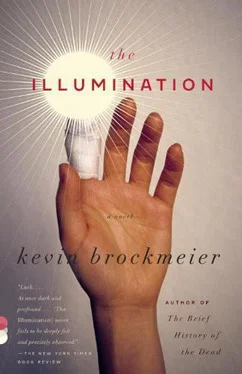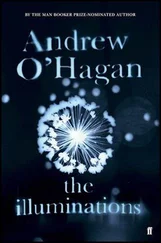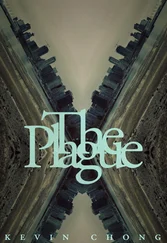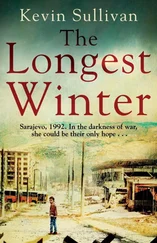So either all of them had died or none of them had.
He decided they were still alive. Abnormal but alive. Luminescent but alive. The cars were still gunning their engines at one another. New Fun Ree was still steaming the air with its smell of noodles and battered chicken. And his wounds were still pulsing and burning. The only difference was that he could see the nerves working now, growing brighter with each burst of pain.
The one whose tooth was shining said, “What the hell is up with you guys? Have you seen yourselves?” and the others said, “Have you seen your self?” and, “Look in a mirror, Stephen Hawking,” and, “ ‘Oh, my tooth, my tooth. Christ, fellas, I’ve gotta get to a dentist. This thing is about goddamn killing me.’ ” They traded a laugh at the impersonation. From the mouth of the alley he listened to the four of them argue: What was happening? How long would it last? Who else was it affecting? Every so often they paused to smack him or use the knife, but without any real brutality now, as if they were hurting him just to see the light blossom open beneath their fists, the glittering silver stream the blade left in his skin. His head was clear despite the pain. He was no longer angry or frightened. He watched with interest as his body was chafed and torn, thinking, Look what’s here inside me. Who ever would have guessed?
Finally the one with the hoops in his ear said, “Um, listen, guys, which was it? Did Vannatta say the twelve hundred block or the twenty-one hundred?”
“Look for the Chinese place with the red awning is all I remember.”
“It was twelve hundred, right, wasn’t it?”
“No, twenty-one, I thought.”
“Shit, did somebody keep the note?”
The one with the insect bites spattering his neck took a square of yellow paper from his jacket and unfolded it. “Twenty-one hundred,” he read.
The conversation seemed to drop down a well. Somewhere overhead an exhaust fan was whirring. On the street a basketball slapped the pavement.
“Well,” the smaller one said. “I don’t think the King of the City here’s our man.”
Which was exactly what he had tried to tell them when they marshaled him into the alley: he wasn’t their man, he didn’t have the bricks, he wasn’t even sure what the bricks were. But as usual, somewhere between the thought and the statement, his words had hit a blind curve and been wrenched out of shape, so that what he said was not at all what he had intended to say: “No, no, I’m him. Bricks, uh-huh, bricks.”
“All right,” the smaller one decided. “Here’s the agenda. You, you, and you—go find the other Chinese restaurant. Red awning. Twenty-one hundred block. Track down the dude who’s got our stuff. Me, I’ll stay here and clean up this mess.” The three of them tramped past the dumpster, the one with the ski jacket rubbing his neck with the bent end of a tire iron, his insect bites pricking the air like a firework.
As soon as the others were out of sight, the smaller one made a study of the damage they had done to him, his eyes pausing at each radiant wound like a kid playing with his first magnifying glass. When he had finished, he gave a long drawn-out whistle and said, “Hey, I’m sorry, man. We really worked you over, didn’t we? Look, let me help you get home. Where do you live? Somewhere around here?”
“Around here.” He gestured farther down the alley, to the alcove where he kept his shopping cart, with his books and his blanket all bundled up inside.
“Jee-zus. All right, then. Let me get you to the ER.”
It took the smaller one a while to persuade him to leave his shopping cart where it was, concealed between a dumpster and a plat of cardboard. He helped him totter to the sidewalk, supporting him as he limped on his busted kneecap, which thrilled with light every time his foot struck the ground. By the time they reached the curb, the glare was unremitting. The smaller one looked up and down the street and complained, “Those dumb assholes took the car, can you believe it?” He hailed a taxi. At the hospital, he removed a horseshoe of hundreds from his jacket, thumbed off five, six, seven bills, and reached across the seat with them. “Good luck, man,” he said. “No hard feelings, I hope.” He tucked the money into his pocket, then opened the door and urged him outside.
He stumbled into the entrance bay, where several tired-looking doctors sat watching people arrive, pointing, nodding, shaking their heads, as if at a street performance they were too exhausted to appreciate. No one seemed to know what was going on. The halides were altering the whites and yellows of everyone’s clothing, lending them a flat blue baseball-park color, but the strained tendons and broken bones of the incoming patients were still plainly visible, even to him. There was the one in the tank top, the young mother, two big shimmering battery bruises on her back. The one with the star cluster of hives on his face. The elderly one with a dog bite showing through her stockings, as round and dazzling as a crown tipped with diamonds. But in all that shining parade of injuries, none was so spectacular as his own. As the taxi sped away, the doctors saw him stumbling along the handicap ramp and sprang up from their benches, calling for a stretcher. A radio was playing at the front desk. He heard a newscaster intoning, “From all over the world this evening we are receiving similar reports—of the ailing and the wounded, shedding light from their bodies,” which meant it wasn’t just them, it wasn’t just here, it was everyone and it was everywhere.
Quickly he was wheeled down the hallway. In the waiting area, he saw a man he knew from the camps, the one with the old photo of himself heat-pressed onto his T-shirt, a young peroxide-blond lifeguard with a girlfriend on his arm and a stripe of zinc on his nose. And there at the water fountain was another, the one with the braided gray beard and the Scottish terrier. And later he would hear that a third, the one who sold hairbrushes from the sidewalk in front of Fantastic China, had been hospitalized and died that same night with six broken ribs and a cerebral hemorrhage.
Two of the doctors lifted him onto a bed, and the room flooded with technicians and orderlies, anesthesiologists and nurses. The one whose eyes were two different colors asked him his name. If ever there was a question whose answer he had rehearsed, it was this, but he must have been in more pain than he realized, because his tongue let him down again. “More. More Put. More.” He felt something brushing his fingers and looked down to find himself holding a notepad and pen. His left hand, his dominant one, the hand that was torn at the webbing, kept filling with a silver mercury he eventually recognized as his blood, so he used his right, spelling his name out one slow letter at a time: Morse Putnam Strawbridge.
“Well, Mr. Strawbridge, hang in there, and we’ll get you put back together.”
He watched as his clothes were shorn from his body, felt a pinch on his arm, and much later, when he woke up, a pair of women were standing over him, the high clouds of their faces hovering against the blue ceiling. The one with the hint of a headache glowing on her brow said, “It’s good to see you again, Mr. Putnam. Are you ready for your morning exercises? We’re going to start with the heel slides today. Last night we made it to ten. We’re going to shoot for fifteen this time, okay?”
He tried to swallow, and everything shuddered slightly. The one with the headache was Diane, and the one gazing out the window, watching the buckeye pluck at the wind with its leaves, was Cici. Cici, who believed she was so much better than Diane, so much prettier, so much more sophisticated. Cici, who earned twice the pay for half the work, the lazy sponge. Diane lifted Morse’s blanket aside, exposing the fearsome light show of his joints and muscles. Her temples were pounding. She didn’t want to touch him. There was dirt and then there was dirt , she thought, God’s good soil and the grime that sank into a person’s flesh and never went away, no matter how thoroughly you scrubbed his filthy body. Heaven forbid her Billy end up like that one day. It’s your job, Diane. You don’t have to like it. Just brazen up and do it. One hand on the ankle, and the other on the hip. That’s the way.
Читать дальше












